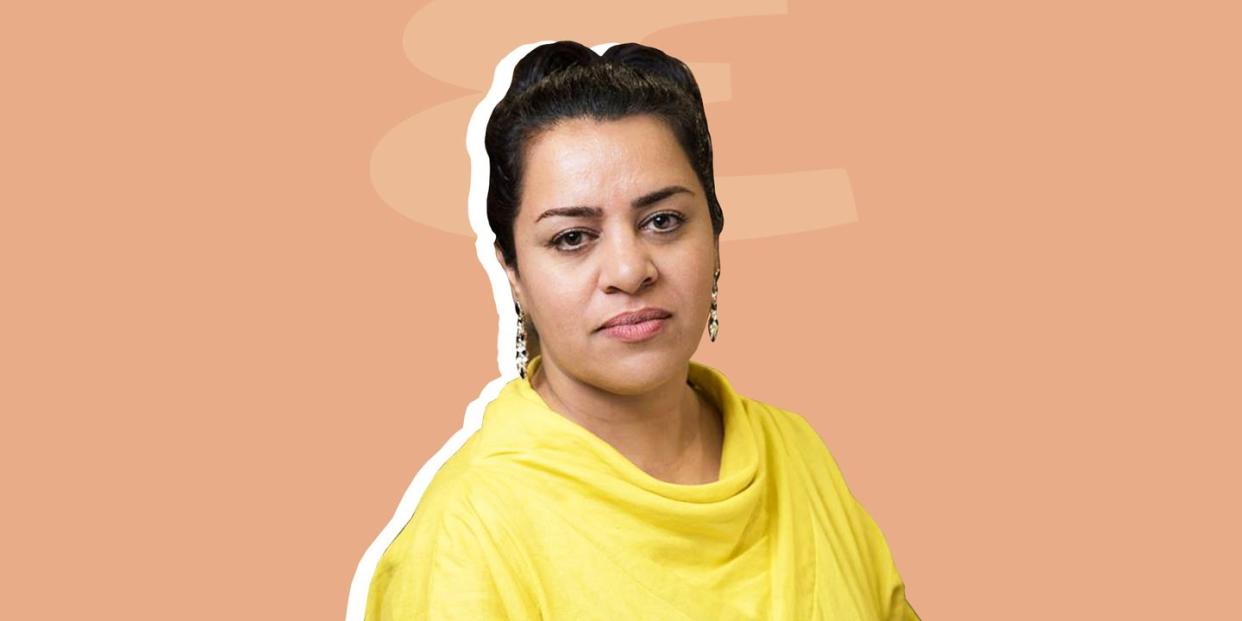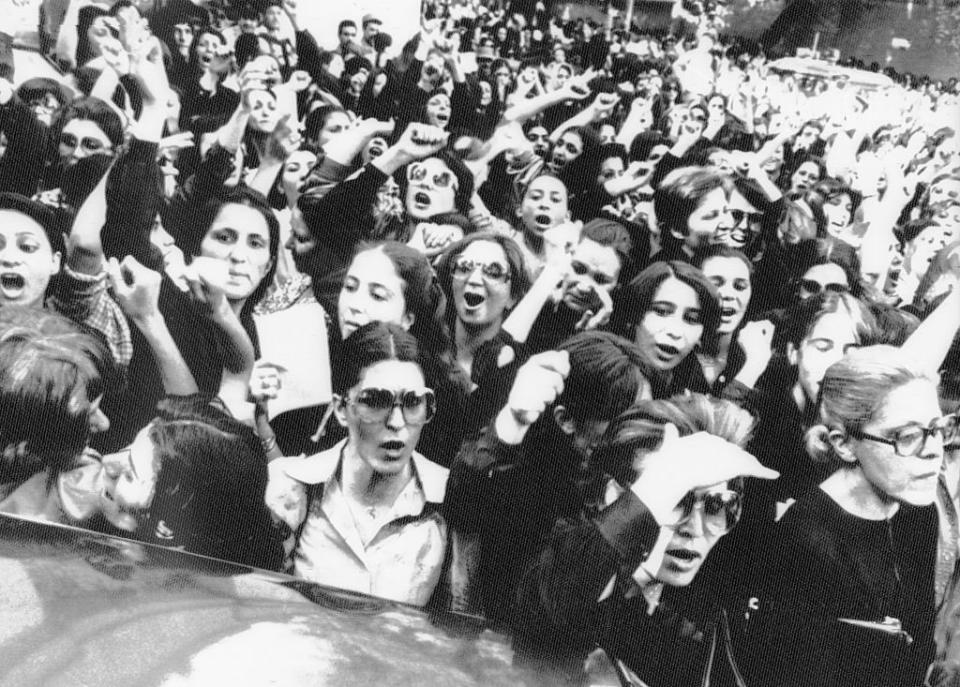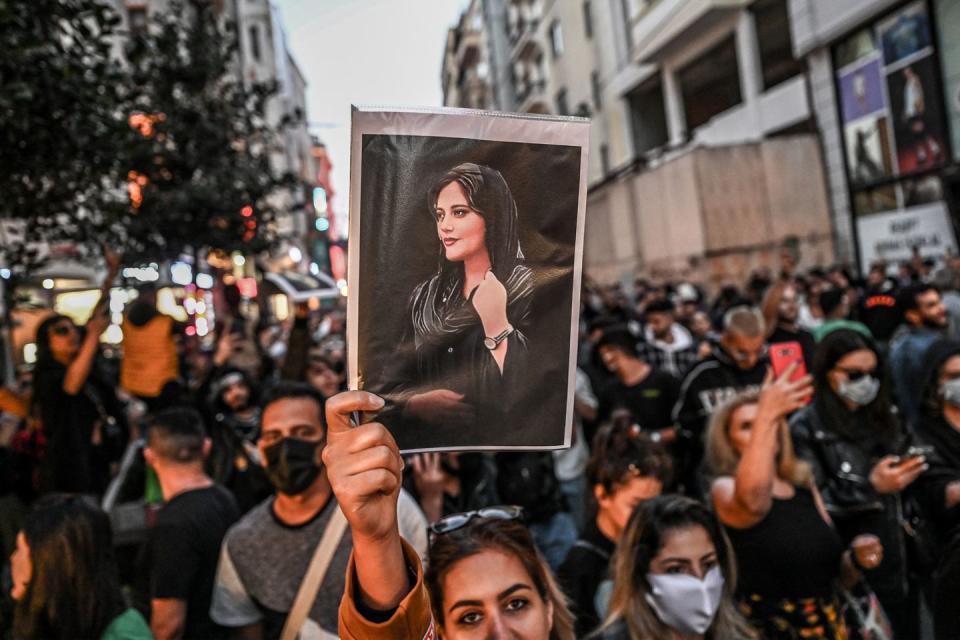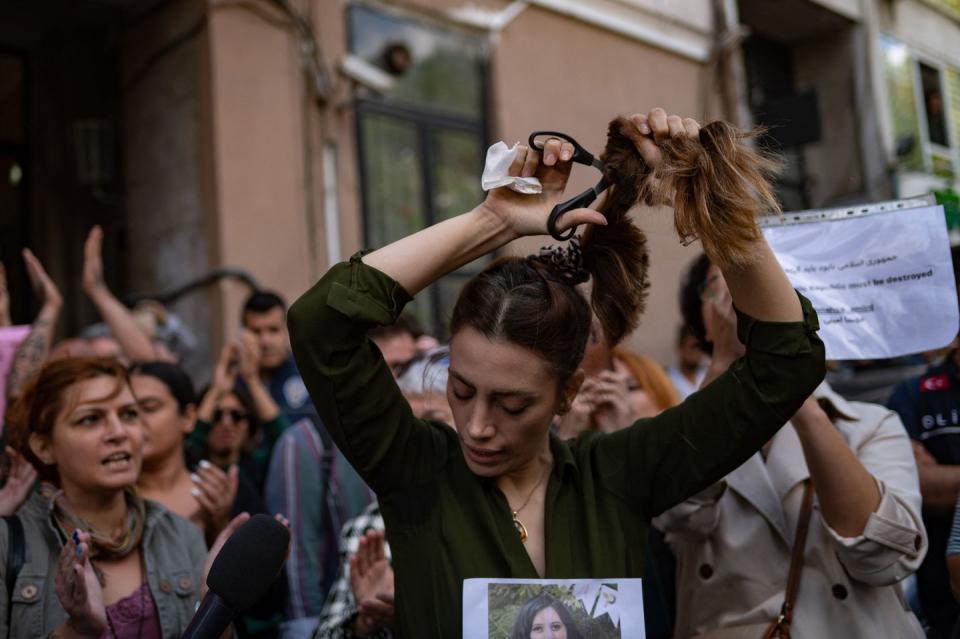For Shokoofeh Azar, "Final Victory Against the Islamic Regime is Very Close"

- Oops!Something went wrong.Please try again later.
On September 13th, 2022, a 22-year-old Kurdish woman named Mahsa Amini was arrested by Iranian Basiji agents—widely known outside Iran as the “morality police”—for the alleged crime of improperly wearing hijab. Three days later, she died in a coma that resulted (according to witnesses and doctors) from a severe beating at the hands of the Basij. This, it now seems, was the last straw for a people who have lived under the repression of the Islamic Republic for over four decades. Protests exploded across the country and have continued for over a month.
Iranians living in exile abroad—those who were forced to flee the country for any number of reasons, but generally for the crime of openly expressing opinions deemed oppositional to the Islamic Republic—have watched these events from afar with great anticipation. Among them is Shokoofeh Azar, journalist, activist, and author of the Booker Prize-nominated novel The Enlightenment of the Greengage Tree. Written from her adopted nation of Australia, Azar’s novel—whose translator elected to remain anonymous out of fear of reprisals—provides an examination and critique of the events following the 1979 Iranian Revolution through a dazzling lens of magical realism. She is currently working on the follow-up, The Goukaran Tree of Our Kitchen.
Having been arrested by Iranian government forces several times, Azar is all too familiar with the risks of opposing the current powers that be. Esquire spoke with her in a conversation that spanned her own experiences, the protests, and how sympathetic governments and individuals outside Iran can support the movement.
Esquire: You were very young when the Iranian Revolution occurred. Do you have any memories of this period?
Shokoofeh Azar: When the revolution happened I was seven years old, and when the revolution solidified its foundations I was around 12 or 13 years old. In the two to three years at the beginning of the revolution, the hijab was not compulsory for women. I remember that we went to school without the compulsory hijab, but little by little, they made the hijab compulsory in offices, schools, and universities. Of course I have many unpleasant memories of that time.
In middle school, chador were mandatory in schools in small cities and villages. I, who was only 12 or 13 years old, went to the school principal and said that I have a manto (long uniform) and a veil. The manto and veil were part of the mandatory hijab, but they were not satisfied with it and wanted us to wear a chador over it. I told the manager, “I can't wear a chador.” The chador is a long black cloth as tall as our height, which we had to keep around our heads and bodies. Holding the chador over my head and body the way they expected was a skill I didn't have and didn't want to have. A few years later, when we had to go to the nearest city for high school, the principal of the school—who was also a member of the Islamic Revolutionary Guard Corps—firmly ordered, “Either you wear a chador or you are not allowed to study.” And in this way, I also had to wear a chador for all four years of high school.
I have many memories of the ‘80s—the most brutal decade of this regime. I remember that morality police cars were moving at a very low speed among the people, and the men and women who were sitting in them, like scavengers, looked at us as prey. Anyone with a little makeup or hair out was beaten and dragged into the car and taken to the police station. I personally was taken by them to the police office. In the ‘80s, I once saw one of the female moral police give a cotton swab to a woman wearing lipstick to wipe her lips. As soon as the woman pulled the cotton to her lips, her lips split open and blood splattered out. They had put a razor in the cotton! This is why we believe that the Islamic regime was the first ISIS regime.

What is your position on the events in Iran? What do you think the outside world should know about it?
As always, I am on the front against the Islamic regime with all my strength. From the time I chose the job of a journalist in 1998 until today, when I live as an exiled writer and protester in Australia, the most important motivation of my life and activity has been to overthrow this regime and establish a secular-democratic political system that will be governed by patriotic and peace-loving Iranians.
Regime change in Iran will not only save 100 million Iranians, but also lead millions of Afghans and the entire Middle Eastern people to the liberation movement against political and fundamentalist Islam. What I would like the people of the world to know is that the change of Iran's regime is not the will of the leaders of Western countries. They want Iran and the Middle East to be in war, blood, and repression so that they have cheaper access to energy and also have an excuse for military presence in the region. And this is exactly what we, the people of Iran and the Middle East, do not want. We have come to destroy the Islamic regime of Iran and to surprise and change the foreign policies of Western countries. We have come to build an Eastern world that can be as modern and progressive as the West, but at the same time free from Western slaveholding views.
What role, if any, can Western governments play in the current uprising? Or should they stay out of it altogether?
What the Western governments can do about our revolution are four things. First, to see us and recognize our voice of protest and reflect it in their media. Second, to isolate and embargo the regime in various ways. Third, Western women politicians should not wear a mandatory hijab when entering Iran. Fourth, expel all Iranian officials and their families in their countries and confiscate their property for the benefit of the Iranian people, so that they can be handed over to the new government after victory. We need global sympathy and cooperation to overthrow this backward and petrified regime because we have not taken up arms. We want to change this regime with our voice, pen, and soul, and take back our streets. We are peaceful, civilized, and educated people. And although this regime has killed our people for 43 years, we have not and will not commit systematic violence.
What is it like for you to watch the protests from outside the country? What do you think Iranians and sympathizers living outside Iran can do to help?
Since 2010, when I was out of Iran, Iran has burned many times in the fire of anti-regime demonstrations. Every time I have shed tears and I have been completely angry because I could no longer personally participate in anti-regime demonstrations in the streets of Tehran, as I did before. But over time, I learned that instead of getting emotional, I have to have a plan. My specific plan is to write my novel non-stop, which, like the previous novel, is against the Iranian regime. Another thing that I can do from a distance is what I am doing now: participating in the demonstrations of Iranians abroad, conducting interviews, and writing articles against the Islamic regime.
But Iranians who do not use the pen tool should inform their governments with hashtags, internet campaigns, and street demonstrations in their cities and countries. They should write to the parliamentarians and ask them to isolate the Iranian regime. They should also ask all governments to block the wealth of Iranian politicians in their country for the benefit of the Iranian people. Now we know that Iranian politicians are sending huge sums of money to Arab, European, and South American countries. Canada and Australia are money laundering paradises for Iranian politicians. These governments should block all their suspicious money for the benefit of the Iranian people and return it to Iran after changing the political system of Iran. Another task of us Iranians abroad is to talk to our non-Iranian friends and relatives about Iran's history, culture, and politics, and to inform them and ask them to use any means at their disposal (pen, art, music, hashtags, etc.) to empathize and accompany Iranians. This is what we need now more than ever: the world's sympathy and companionship with the Iranian people.
Many people, particularly on the political left, have mixed feelings about sanctions or outright oppose them. But I’ve heard more and more Iranians say that they are necessary. Are you in favor of sanctions?
Absolutely. And these sanctions should become harder and more widespread day by day. We must help to paralyze this regime. You Westerners should help us so that after our victory, these corrupt people and their families will not have a place to escape and seek refuge. Right now, the families of these corrupt people are living freely in Western countries with billions of dollars they stole from our country. America and Canada are their paradise, and as you saw, the Prime Minister of Canada refused to say that he believes this regime is corrupt.
You’ve been arrested by the Iranian government a number of times due to your work.
I was arrested and interrogated several times for the social articles I wrote about the rights of workers, children, students, women, and street strikes. This is unfortunately very common under this regime. About twenty journalists have been arrested and imprisoned in the last two weeks alone. Reason: writing articles that are not compatible with the taste and propaganda of the regime. Among those who have been arrested and imprisoned in the last two weeks is Nilofar Hamedi, the one who first published the news of the suspicious death of Mahsa Amini.

I was arrested twice in street demonstrations in Tehran and once at home. My belongings were confiscated, and I was interrogated and imprisoned. Being arrested, interrogated, and jailed for peacefully protesting in the street or writing makes you feel like a criminal all the time. Worse, even some of my colleagues at the newspaper treated me badly after I was released. They feared those who were imprisoned because they thought they were spying on their colleagues. Maybe they were right; there were many examples of these events in the first three decades of the revolution. But in the fourth decade and over time, people became more sympathetic and united; now, they treat political prisoners like heroes. Right now, people have high hopes that after the victory, political prisoners will take charge of the country's affairs in the future, because they are all educated experts, including journalists, sociologists, lawyers, teachers, university professors, students, lawyers, doctors, etc.
I was imprisoned three times in three different informal prisons in Tehran. There was a place like an ordinary multi-story apartment in the middle of the city, which looked like other apartments from the outside. The regime has many such informal prisons. Right now, when people are involved in demonstrations, thousands of people have been arrested and taken to unknown places, and even their families cannot be heard from.
What do you hope Western audiences learned from your novel?
I wrote this novel for myself. Above all, I wanted to make sure that I could write a novel in a style that I would enjoy. After that, I wrote it down for the record—recording the history of the feelings of us Iranians in these forty years. In the next step, I wrote it for Iranians. Because after the revolution, Iranians never had the chance to read a book about themselves without censorship, or rarely has this happened.
I wanted the people of Iran to know that there are writers like me, even if they are a handful, who see them and record the disastrous events that have happened to our society. On the other hand, I wanted to remind Iranians that although this regime has caused a lot of damage to our culture and life, we can rebuild ourselves by relying on our own culture, art, and literature, which we have seen in the recent demonstrations. In the end, yes, the western audience was also in my mind—that they should see the real face of this regime through literature. What I wanted to do in this novel was to introduce the capabilities of Persian literature to the world, and to tell them about the unpublished tragedies in Iran.
Can you suggest a few Iranian writers, musicians, and thinkers non-Iranians can explore to learn more about the situation in Iran?
The song “Baraye” was released during the recent protests and it hurt our hearts. Its singer, Sharvin Hajipour, was arrested for this song. Millions of Iranians around the world wrote why they want this regime to be overthrown, and Sharvin made this song with lyrics from some of those hashtags. Recently, some foreign singers translated this song into other languages and sang it in support of our movement. This song is a great example of a wave that is shaping. There are many voices in Iran that even we Iranians have not heard because of suffocation and censorship. I am very eager for the freedom of Iran as soon as possible, and then we will see hundreds of names that will have new ideas and artistic works at the world level.
This regime has opposed all modern writers, poets, and thinkers, which is why the works of our best thinkers and artists have always been disrespected and even completely censored in the periods after the Islamic Revolution. People like Forough Farrokhzad, Ahmad Shamlou, Mehdi Akhwan Sales, Ahmad Mahmoud, Sadiq Hedayat, and Ahmad Kasravi. Reading their works helps to better understand the situation of Iranians in the last 50 to 100 years. Regarding political analysis, I can introduce Ali Akbar Saedi Sirjani's books (who was killed by the regime), The History of the Iranian Constitutional Revolution written by Ahmad Kasuri, The Coup by Yervand Abrahamian, Iran Between Two Revolutions written by Yervand Abrahamian, A Look at the Shah by Abbas Milani, and The Answer to History written by Mohammad Reza Pahlavi.
What outcome do you hope for in regard to the current protests in Iran?
This demonstration is different from all previous demonstrations. In fact, this demonstration was the result and evolved form of the previous demonstrations in the previous four decades, and it has already achieved several very important achievements. First of all, it has brought the Islamic regime to a point of no return. Because for the first time, women took off their mandatory headscarves in the streets and burned them in public. This means that moral police will no longer be tolerated in the streets. Right now, a large number of brave women go to the streets or to work without the mandatory hijab. This means the definitive failure of 43 years of compulsory Islamic education in Iran.
Second, this demonstration united Iranians from all over the world, with any political or religious orientation, against the regime and drew them to the streets. Third, the demonstrations of Iranians around the world brought the parliaments and governments of Western countries to a point of no return. It surprised them and made them understand that the Iranian people will not tolerate the Islamic regime anymore, so the Western governments should also stand behind the Iranian people and isolate the regime. Fourth, for the first time, independent people, influencers, artists, and even members of the parliaments of Western countries supported the people of Iran and condemned the Islamic regime. So far we are victorious in this field, and our final victory against the Islamic regime is very close.
While Iran is currently struggling to escape its authoritarian regime, many countries around the globe have taken clear steps toward fascism. Italy is the latest and most obvious example. What do you think people of the world need to understand about what it’s really like to live under a fascist/authoritarian regime?
Our demonstration and revolution will be a great lesson for the world. We show that oppression is not sustainable and every nation has a threshold of patience. It is no longer the 19th or 20th century when people are unaware of each other and it was difficult to unite them. Today's era is the era of communication, awareness, and entertainment. People want freedom, prosperity, entertainment, and progress. Any government that deprives people of a lively and free life is doomed, sooner or later.
Right now the women of Afghanistan are suffering under the yoke of the Taliban, but they have supported us Iranian women in this difficult situation and demonstrated for us. The Taliban responded to them with fire and blood just yesterday and burned a school. However, the people of Afghanistan do not stop fighting. One day they will rise up like the people of Iran and burn the Taliban and their thoughts without needing the American army or other Western countries. Just as today the mullahs in Iran are hiding in their holes and cannot be found on the streets, one day the Taliban will also have to be removed.
On the other hand, the women of Turkey, Lebanon, and even Syria have supported us. Their singers cut their hair on stages and accompanied us in our anti-Islamic and anti-regime protests. This means that they are tired of politicized Islam in their own countries and will not tolerate it any longer. Any vision of fundamentalism in the 21st century and in the age of the Internet is doomed to destruction, sooner or later. However, people should be careful not to let such ideas gain power. Ideas should be nipped in the bud. There is no other solution. Otherwise, millions of people will suffer and thousands of innocents will be killed.

Are you optimistic or pessimistic about Iran’s future?
I am very optimistic about the future of Iran, and I have much evidence and many reasons for that. We are like an exploding capsule that has not been allowed to grow, move, and innovate for forty years. Although there is anger and disgust in this capsule, there are far more important and better things, such as culture, art, science, philosophy, and literature. In the coming years, you will hear very important news about the brilliance of Iranians at the global level. We are like the phoenix that finally rises from its ashes.
You Might Also Like

